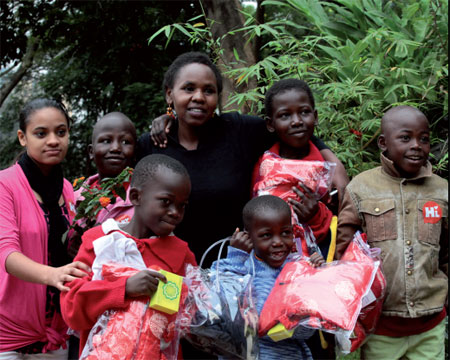Workshop focuses on HIV/AIDS prevention
|
Grace Muthoni (center) and children from MaxFacta. Feng Xin / China Daily |
NAIROBI, Kenya - More than two dozen teenage peer educators in Kenya met their Chinese counterparts in the country's capital, Nairobi, for a training workshop on peer-to-peer HIV/AIDS education on Sunday.
The workshop was co-organized by the China NGO Network for International Exchanges (CNIE) and the NGO Co-ordination Board of Kenya. It's the preface of the China-Africa People's Forum, which began on Monday and will end on Tuesday, and is the first NGO exchange between China and Africa.
"Peer-to-peer education is very effective in preventing HIV/AIDS among young people," said Wang Weilong, a 21-year-old Chinese volunteer for the China Family Planning Association.
Wang gave his Kenyan peers a training session during the workshop. "Young people can often discuss difficult and sometimes sensitive topics such as love, sex and abortion in a straightforward and frank fashion without worrying about being stigmatized," Wang said.
Wang said an important part of his training session is to let his peers feel what it is like to live with HIV/AIDS. It's more than just carrying the virus, he said. The stigma and discrimination can hurt more, he said.
Five children whose life has been affected by HIV/AIDS attended the workshop's opening ceremony. Erick Owino, 9, lost his parents and became an orphan when he was 5. He lives at a community-based rescue center in Nairobi together with 23 other orphans.
Most of their parents died of AIDS.
"I don't know exactly how many kids are like Erick (in Kenya)," said Grace Muthoni, the manager of the MaxFacta rescue center, short for "maximizing facts on HIV-AIDS".
"But the situation is pathetic," she said.
According to the latest statistics compiled by the Joint United Nation Programme on HIV/AIDS, in 2009 there were about 33.3 million people living with HIV worldwide, and 1.8 million people died of AIDS-related diseases in the same year. Sub-Saharan Africa alone shares 68 percent of the global HIV population.
"People with HIV are still very much stigmatized in Kenya," Muthoni said, noting that even children of parents with HIV who are healthy carry the stigma.
The 36-year-old community organizer lost her best friend to AIDS several years ago. She decided to take care of her friend's three kids, and that was when she started MaxFacta to help more orphans.
Muthoni's rescue center has taken in 24 orphans, but she has no donors. She runs a small business, but the income can hardly cover the cost of the rescue center. Muthoni and her three staff members often have to work outside the rescue center to raise money for the orphans.
She said 200 Kenya shillings ($2.10) is enough to provide one child with three meals a day.
"But sometimes they have to go hungry," Muthoni said. "It's never enough."
Taking care of orphans whose parents died of AIDS is one measure being taken by communities in Kenya. Many non-government organizations such as the Kenya Legal and Ethical Issues Network (KELIN) are working on eliminating discrimination against people with HIV/AIDS and their children.
The goal is to raise awareness "so that when they go to school, people will not avoid kissing and hugging them", said Allan Maleche, KELIN's coordinator.
The stigmatization of people with HIV/AIDS also exists in China, Wang said. People living with HIV/AIDS are very much restricted from social and professional life. Because of worries about being stigmatized, they try to hide the fact that they have been infected with the disease. Wang said this hinders the free flow of information and communication and might even result in more infections.
"I think if we could eliminate the stigmatization of HIV/AIDS, it would just be treated like any other type of disease," Maleche said.



















